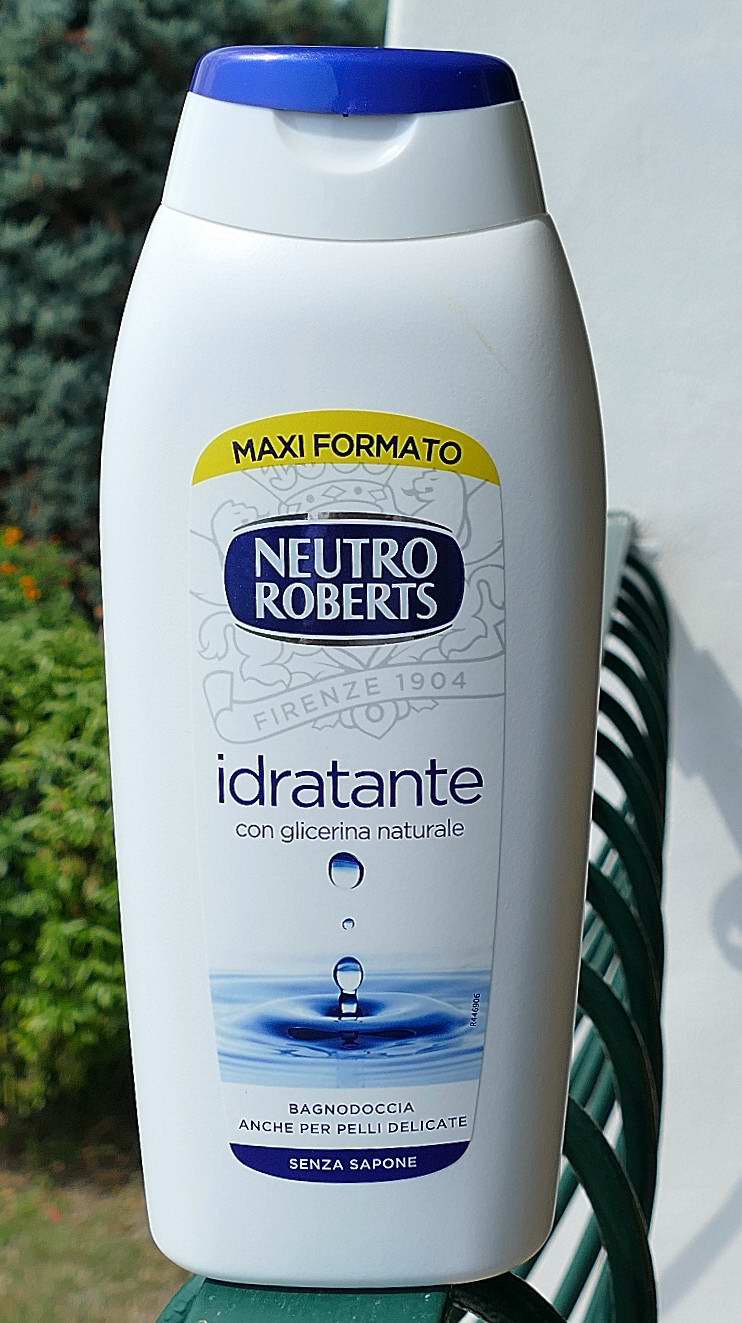Neutro Roberts idratante 700 ml

Ingredients: Aqua, Sodium Laureth Sulfate, Glycerin, Cocamidopropyl Betaine, Parfum, PEG-7 Glyceryl Cocoate, Decyl Glucoside, Glycereth-2 Cocoate, Coco-Glucoside, Glyceryl Oleate, Styrene/Acrylates Copolymer, Sodium Chloride, Disodium EDTA, Citric Acid, Sodium PCA, PEG-120 Methyl Glucose Dioleate, Sodium Hydroxide, PPG-20 Methyl Glucose Ether, Hydroxycetyl Hydroxyethyl Dimonium Chloride, Propylene Glycol, Methylchloroisothiazolinone, Methylisothiazolinone, Alpha-Isomethyl Ionone, Amyl Cinnamal, Benzyl Salicylate, Butylphenyl Methylpropional, Citronellol, Coumarin, Eugenol, Geraniol, Hexyl Cinnamal, Limonene, Linalool
Very complex product with as many as 33 ingredients.
Let's look at the most significant ingredients to understand what we'll be slathering on our skin. The label informs us that the formula is dermotested soap-free. However, I detected many components that I frankly don't like: many scientific studies reveal their allergy dangers.
Sodium Laureth Sulfate. SLES, is a chemical compound and belongs to a group of salts of sulfated ethoxylated alcohols. It is a surfactant that generates foam and is widely used in toothpastes, shampoos, liquid soaps. Since its solvent power is among the least aggressive on the skin, it is used in delicate soaps and shampoos. However it may cause irritation to the eyes if used in high quantities. As it is not mandatory to indicate the percentage or the quantity of chemical products on labels, it is however difficult to know how much Sodium Laureth sulfate is in the product.
Glycerin.Trivalent alcohol, hygroscopic, also used in food as a stabilizing additive. In detergents, shampoos and other cosmetic products it is included in the formula with the aim of moisturizing and softening the skin, preserving it from aging or roughness.
Cocamidopropyl Betaine. Amphoteric zwitterionic chemical compound. It is a surfactant (removes dirt particles) of synthetic origin and is used in cosmetics and body wash products with an antimicrobial function. The CIR Panel concluded that because this ingredient does not exhibit significant toxicity, when formulated to be non-sensitizing (i.e., it can be based on a quantitative risk assessment), it is safe for use as a cosmetic ingredient in the use and concentration practices of this safety assessment. However, it should be remembered that repeated and prolonged use of surfactants may cause irritation and allergic contact dermatitis.
Parfum, is a generic term for a fragrance and is used in cosmetic products to denote fragrance and aroma compounds and their raw materials. They may be natural products, but most are of chemical origin.
PEG-7 Glyceryl Cocoate. It is a non-ionic surfactant (removes dirt particles) often associated with PEG-200 Hydrogenated Glyceryl Palmate, which, however, has a lower penetration coefficient and is obtained chemically, from palm trees.
Decyl glucoside is a PEG-free stabilizer designed for the stabilization of nanoparticles. Used in cosmetics in liquid soaps and shampoos as a surfactant.
Glycereth - 2 Cocoate is a chemical component, non-ionic surfactant, an ester of Polyoxyethylene Glycerol and is used : by the cosmetic industry as an emollient thickener foaming emulsifier in dishwasher detergents with the above purposes. It has a low eco-toxicological profile and is derived from coconut oil and glycerin.
Coco-Glucoside is a non-ionic surfactant (removes dirt particles) that is derived from coconut or palm oil. In cosmetics it is used as a foaming agent and emulsifier. It cleanses the hair and increases its combability. Used in the treatment of acne, face masks.
Glyceryl Oleate PEG-5 emollient and emulsifier of mostly vegetable origin. Biodegradable and non-irritating.
Styrene/Acrylates Copolymer is a copolymer used in cosmetics as a matting agent.
Up to this point all of the ingredients reviewed are of no concern, but a good portion of those that follow did not appeal to me.
It is well known that Metilcloroisotiazolinone o Methylchloroisothiazolinone e Methylisothiazolinone - MIT two chemical compounds usually used together, can cause allergic contact dermatitis. Because of this reaction, restrictions have been placed on the concentration of these two chemical components used in cosmetic products. In recent years, the prevalence of allergic contact dermatitis to isothiazolinone preservatives, namely, Methylchloroisothiazolinone and Methylisothiazolinone, has increased dramatically. Cosmetic products are some of the major sources of exposure.
Alpha-Isomethyl Ionone It is a chemical component on which many laboratory tests have been carried out. It can give allergic reactions if the user has very sensitive skin and especially because it is often in the company of Linalool and Eugenol. Among other things, it has been evaluated for systemic toxicity in rats.
Other ingredients I prefer to avoid: Amyl Cinnamal , Butylphenyl Methylpropional , Hydroxycetyl hydroxyethyl dimonium chloride , PEG-120 Methyl Glucose Dioleate ,
Conclusions
Overly complicated product with ingredients I don't like. I will not be buying it again.
![]() Neutro Roberts idratante 700 ml
Neutro Roberts idratante 700 ml 

